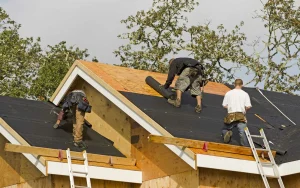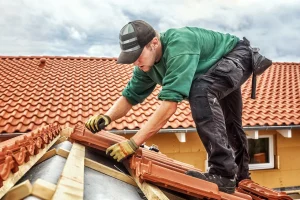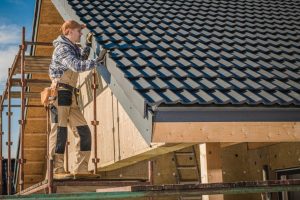One of the most common dilemmas homeowners face when dealing with roof issues is deciding whether to repair the existing roof or opt for a complete replacement. While both options come with their pros and cons, making the right choice depends on various factors such as the age of your roof, the extent of the damage, and your budget. In this blog, we’ll help you weigh the options and make an informed decision.
1. Assess the Age of Your Roof
The age of your roof is a critical factor in deciding whether to repair or replace it. Most asphalt shingle roofs have a lifespan of about 20 to 30 years, while materials like metal, tile, or slate can last significantly longer. If your roof is relatively new and the damage is minimal, a repair may be sufficient. However, if your roof is approaching the end of its lifespan, investing in a replacement can save you from future costly repairs.
When to Repair:
- Roof is less than 10-15 years old.
- Damage is isolated to small areas.
- Materials are still in good condition.
When to Replace:
- Roof is older than 20-30 years.
- Extensive wear and tear is visible.
- Multiple repairs have already been done.
2. Evaluate the Extent of the Damage
The severity and scope of damage play a major role in determining whether a repair or replacement is needed. Minor issues, such as a few missing shingles, small leaks, or minor flashing problems, can usually be repaired without much trouble. However, widespread damage, structural issues, or major leaks affecting large portions of the roof may indicate that a full replacement is the more cost-effective solution.
When to Repair:
- Minor leaks or a few missing shingles.
- Small areas of damage from wind or hail.
- Localized flashing issues.
When to Replace:
- Major leaks causing structural damage.
- Sagging roof deck or widespread water damage.
- Multiple areas of the roof need attention.
3. Consider the Cost
Budget is always a key factor in deciding between roof repairs and replacement. In general, repairs will cost less upfront than a complete replacement. However, if your roof has been repaired multiple times in the past or continues to suffer from recurring issues, replacing it could save you money in the long run by avoiding frequent repair costs.
When to Repair:
- Repair costs are much lower than replacement.
- Issues are minor and easily fixable.
- Your roof is relatively new, and repairs are rare.
When to Replace:
- Repair costs are adding up and nearing the cost of replacement.
- You face frequent or recurring problems.
- You plan to sell your home soon and want to increase its value.
4. Energy Efficiency and Curb Appeal
Replacing your roof offers the chance to upgrade to more energy-efficient materials, which can lead to lower heating and cooling bills. Newer roofing technologies, such as cool roofs or solar shingles, can improve your home’s energy performance. Additionally, a new roof can significantly enhance the curb appeal of your home, making it more attractive to potential buyers if you’re considering selling.
When to Repair:
- Energy efficiency is not a concern.
- Roof repairs won’t detract from your home’s appearance.
When to Replace:
- You want to upgrade to energy-efficient or eco-friendly materials.
- You’re planning to sell your home and want to boost curb appeal.
- Your current roof looks worn or outdated.
5. Long-Term Plans for Your Home
If you plan to stay in your home for many years to come, investing in a full roof replacement may make sense. A new roof provides long-term peace of mind, ensuring your home stays protected without the need for frequent maintenance. On the other hand, if you’re planning to move soon, a repair may be a more economical choice, allowing you to fix the immediate issues without a large upfront cost.
When to Repair:
- You plan to move in the near future.
- A quick fix is needed to address minor issues.
When to Replace:
- You plan to stay in your home long-term.
- You want a new roof that lasts for decades.
- You want to increase your home’s resale value.
6. Professional Roof Inspection
To make the most informed decision, consider scheduling a professional roof inspection. A certified roofer can assess the condition of your roof, identify any underlying issues, and recommend the best course of action based on the extent of the damage, the materials used, and your specific needs. A thorough inspection can give you the confidence to decide whether to repair or replace your roof.
Conclusion
Deciding between roof repairs and replacement depends on several factors, including the age of your roof, the extent of the damage, your budget, and your long-term plans. While repairs may seem like the more affordable option in the short term, repeated repairs can add up over time. A roof replacement, although a larger investment, may provide better long-term value by ensuring your home is protected for decades to come.
If you’re unsure about whether to repair or replace your roof, it’s always best to consult with a roofing professional. Aesthetic Exteriors Roofing offers expert assessments and solutions tailored to your home’s needs, ensuring you make the right decision for both your roof and your budget.




